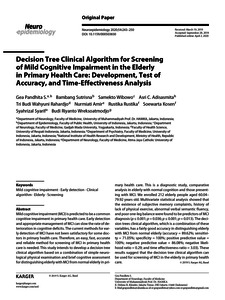Pandhita S, Gea dan Sutrisna, Bambang dan Wibowo, Samekto dan Adisasmita, Asri C dan Rahardjo, Tri Budi Wahyuni dan Amir, Nurmiati dan Rustika, Rustika dan Kosen, Soewarta dan Syarif, Syahrizal dan Wreksoatmodjo, Budi Riyanto (2020) Decision Tree Clinical Algorithm for Screening of Mild Cognitive Impairment in the Elderly in Primary Health Care: Development, Test of Accuracy, and Time-Effectiveness Analysis. Neuroepidemiology, 54 (3). pp. 243-250. ISSN 0251-5350 (Print); e-ISSN: 1423-0208 (Online)
![[thumbnail of 503830.jpeg]](http://repository.uhamka.ac.id/11705/1.hassmallThumbnailVersion/503830.jpeg)  Preview |
Image
503830.jpeg Download (656kB) | Preview |
Abstract
Mild cognitive impairment (MCI) is predicted to be a common cognitive impairment in primary health care. Early detection and appropriate management of MCI can slow the rate of deterioration in cognitive deficits. The current methods for early detection of MCI have not been satisfactory for some doctors in primary health care. Therefore, an easy, fast, accurate, and reliable method for screening MCI in primary health care is needed. This study intends to develop a decision tree clinical algorithm based on a combination of simple neurological physical examination and brief cognitive assessment for distinguishing elderly with MCI from normal elderly in primary health care. This is a diagnostic study, comparative analysis in elderly with normal cognition and those presenting with MCI. We enrolled 212 elderly people aged 60.04–79.92 years old. Multivariate statistical analysis showed that the existence of subjective memory complaints, history of lack of physical exercise, abnormal verbal semantic fluency, and poor one-leg balance were found to be predictors of MCI diagnosis ( p ≤ 0.001; p = 0.036; p ≤ 0.001; p = 0.013). The decision trees clinical algorithm, which is a combination of these variables, has fairly good accuracy in distinguishing elderly with MCI from normal elderly (accuracy = 89.62%; sensitivity = 71.05%; specificity = 100%; positive predictive value = 100%; negative predictive value = 86.08%; negative likelihood ratio = 0.29; and time effectiveness ratio = 3.03). These results suggest that the decision tree clinical algorithm can be used for screening of MCI in the elderly in primary health care.
| Item Type: | Article |
|---|---|
| Subjects: | R Medicine > RC Internal medicine > RC0321 Neuroscience. Biological psychiatry. Neuropsychiatry |
| Divisions: | Fakultas Kedokteran > Kedokteran |
| Depositing User: | Gea Pandhita |
| Date Deposited: | 06 Oct 2021 11:23 |
| Last Modified: | 06 Oct 2021 11:23 |
| URI: | http://repository.uhamka.ac.id/id/eprint/11705 |
Actions (login required)
 |
View Item |

 Dimensions
Dimensions Dimensions
Dimensions